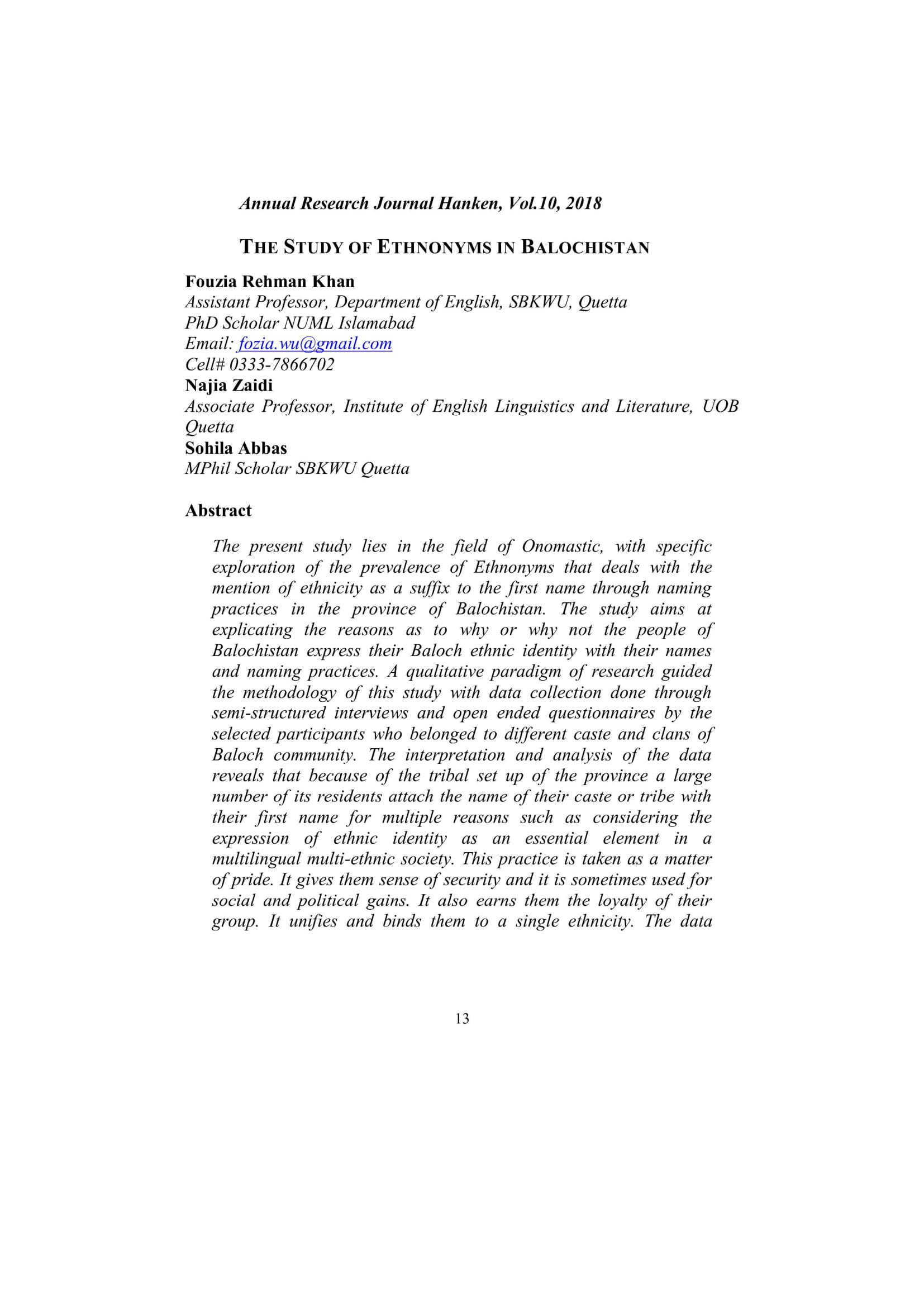THE STUDY OF ETHNONYMS IN BALOCHISTAN
THE STUDY OF ETHNONYMS IN BALOCHISTAN
Keywords:
ethnicity, province, communityAbstract
The present study lies in the field of Onomastic, with specific
exploration of the prevalence of Ethnonyms that deals with the
mention of ethnicity as a suffix to the first name through naming
practices in the province of Balochistan. The study aims at
explicating the reasons as to why or why not the people of
Balochistan express their Baloch ethnic identity with their names
and naming practices. A qualitative paradigm of research guided
the methodology of this study with data collection done through
semi-structured interviews and open ended questionnaires by the
selected participants who belonged to different caste and clans of
Baloch community. The interpretation and analysis of the data
reveals that because of the tribal set up of the province a large
number of its residents attach the name of their caste or tribe with
their first name for multiple reasons such as considering the
expression of ethnic identity as an essential element in a
multilingual multi-ethnic society. This practice is taken as a matter
of pride. It gives them sense of security and it is sometimes used for
social and political gains. It also earns them the loyalty of their
group. It unifies and binds them to a single ethnicity. The data
The Study of Ethnonyms in Balochistan
revealed that there are very few people who do not use ethnic suffix and
deem the practice as unimportant. The study concludes that the naming
practice in Balochistan is based on ethnonyms for centuries and the
practice will continue due to its association with social esteem and
cultural pride
References
Aceto, M. (2002). Ethnic personal names and multiple identities in
Anglophone Caribbean speech communities in Latin America.
Language in Society, 31, 577-608.
Alford, R. D. (1988). Naming and identity: A cross-cultural study of
personal naming practices. New Haven, CT: HRAF Press.
Bourdieu, Pierre. 1991. Language and Symbolic Power. Cambridge, Mass.:
Harvard University Press.
Fossier, R. (2010). The Axe and the Oath: Ordinary Life in the middle Ages.
Princeton University Press. pp. 34–. ISBN 1-4008-3614-X
Gebre,Y. (2010). Cultural contact and change in naming practices among
the Aati Southwest Ethiopia. Journal of African Cultural Studies, 22(2),
pp. 183-194
Harrison, K.D. (2002). Naming practices and ethnic identity in Tuva.
Proceedings of the Chicago Linguistic Society, 35(2)
Haviland, WA., Prins,H.E.L., Walrath,D. & McBride, B. (2016).
Anthropology: The Human Challenge. USA: Cengage Learning
Jayaraman, R. 2005. Personal Identity in Globalized World: Cultural roots
of Hindu Personal names and surnames. The Journal of Popular Culture
(3), pp. 476-490
Kim,J & Lee,K. (2011). "What's your name?": names, naming practices,
and contextualized selves of young Korean American children. Journal
of Research in Childhood Education, 25(3)
Lévi-Strauss, C. (1966). Anthropology: Its achievements and
future. Current Anthropology, 7(2).
The Study of Ethnonyms in Balochistan
Mandende, I. P. (2009). A study of Tshivenda personal names (Doctoral
dissertation).
Su, C. A., & Telles, E. E. (2007). Assimilation and gender in naming.
American Journal of Sociology, 112(5), pp.1383-1415.
Suleiman, Y. (2006). Constructing languages, constructing national
Identities. In
Omonigi and White (Eds). Sociolinguistics of Identity. London:
Continum
Thomas,L.Wareing,S.Singh,I.(eds).(2004).Language, Society and Power.
An Introduction.2
nd
Edition : Routledge Tayler and Francis group.
Ullmann, S. (1962), Semantics, An Introduction to the Science of Meaning,
Oxford: Basil Blackwell.
Zabeeh, F. (1968). What is in a Name?: An Inquiry Into the Semantics and
Pragmatics of Proper Names


